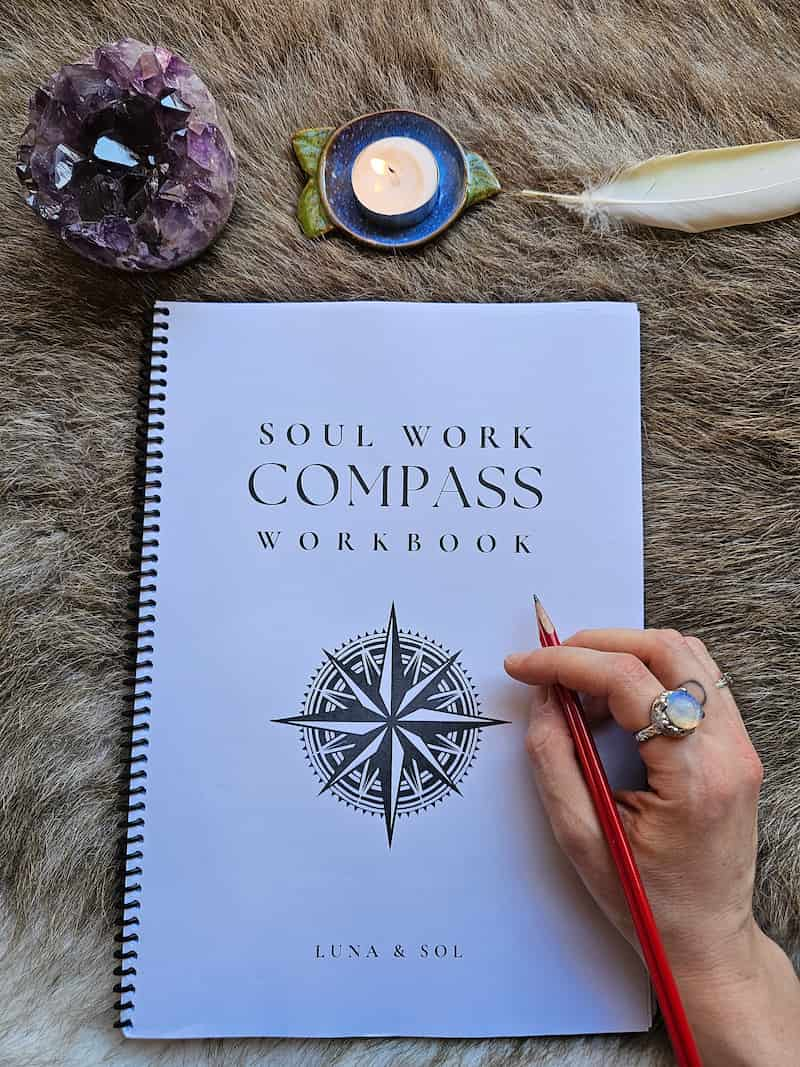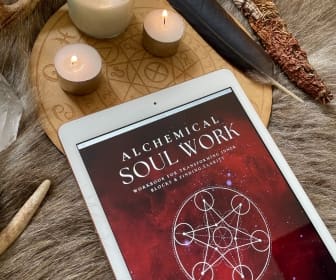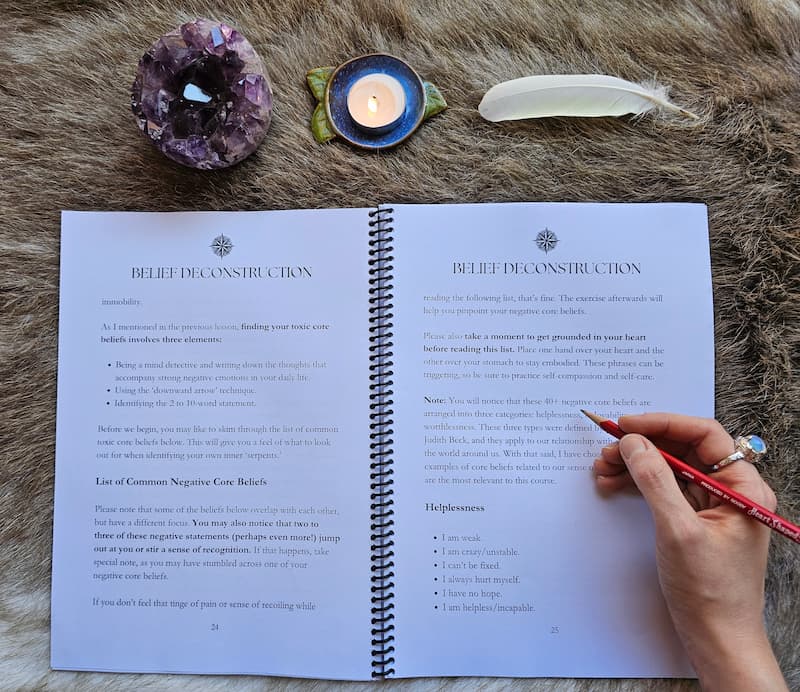When you first dig up the festering mess of your core beliefs from the depths of your being, you’ll likely experience one of three emotions: excitement, confusion, or grief – or all three at once.
As one of the most fundamental practices on the inner journey of soul work, uncovering our toxic core beliefs is definitely not a clean or sanitary path.
But it is vital.

Soul Work Compass Course:
Drifting through life without direction is exhausting. If you feel paralyzed by confusion or self-doubt, this course is your map out of the fog. We guide you safely through your inner darkness to uncover your true needs, values, beliefs, wounds, and sacred gift. Turn your confusion into crystal-clear direction and find your True North today.
We ALL carry our own devilish assortment of toxic core beliefs that eat away at our sanity on either a conscious or unconscious level. Typically, they influence every level of our being.
To effectively develop self-love, open our hearts to others, and experience more inner peace, we need to turn inwards. We need to illuminate the darkness. Going in search of your core beliefs is one of the most essential paths for true and deep healing because it goes to the center of your suffering.
Table of contents
What Are Core Beliefs?

Our core beliefs are the unconscious stories, convictions, and judgments we carry about ourselves that define our sense of self. Core beliefs also determine how we feel about others, how happy we are with ourselves, and how we perceive the world at large.
Our core beliefs are even responsible for how successful we are in self-actualizing our deepest dreams and uncovering our personal meaning of life. In short, our core beliefs influence every aspect of our lives. Typically, our core beliefs first develop in childhood and solidify in adulthood.
Core Beliefs and Spiritual Awakening
We heal ourselves on the mental level as we become aware of our core beliefs, release those that limit us, and open to more supportive ideas and greater understanding.
– Shakti Gawain
The whole point of the healing journey of awakening is to loosen our attachment to that which is false and limiting – and this includes our core beliefs. These core beliefs can become so dense and constricting that they contribute to a Dark Night of the Soul (or spiritual crisis).
In Indian philosophy, core beliefs are related to the idea of samskaras, or patterns of conditioning that we continuously repeat in our lives. To connect with our True Nature, we need to become aware of these inner contractions that tend to undermine, control, and pollute our way of living and being.
Why You Keep Repeating the Same Toxic Patterns

Just when you think you have a pretty good idea of who you are … just when life seems to be going well … everything starts spiraling downwards …
Want to get LonerWolf at the top of your Google search results?
Have you ever felt this way before?
(Note: most of us have at some point in our lives!)
We’ve all experienced periods of life where everything is sunshine and roses. We seem to be on the right track. And then – out of nowhere – a mysterious depression descends upon us. (Surprise! ) Or we get a huge anxiety attack that cripples our self-esteem. (Surprise!) Or we self-sabotage, attract the wrong person into our lives, and wind up heartbroken. (Surprise!)
Why does this happen?
You can probably guess what I’m going to say. Yes, our core beliefs are what happened.
“But I’ve focused so much on self-growth and spirituality – what’s going wrong?” you might lament.
My answer is that, most likely, you haven’t gone deep enough into your psyche to undo your old patterns. You’ve most likely taken the outside-in approach where you:
- change your diet
- take care of your body
- ‘hack’ (optimize) your daily routines
- read lots of self-help books
- do sexy yoga
- organize your life
… but for the most part, these are all very external or superficial practices. No matter how much you work on your external life, you still find yourself consumed by toxic shame, anger, self-pity, and self-destructive behaviors.
Don’t worry, it’s not your fault. No one taught you that you need to take the hard path, peek underneath the curtain of your mind, and shine a torch into its deepest recesses.
That’s where this article (and our whole website) comes into play.
Would you like to save this?
Your information will never be shared.
Examples of Core Beliefs to Look Out For

A core belief is not an everyday garden variety belief that pops up spontaneously – it is the mother of all beliefs, the Big Kahuna of suffering, and the King or Queen of your own personal underworld that becomes the central part of your shadow self. This is why shadow work is one of our most recommended methods for exploring our core beliefs.
Often, we are completely unaware of what our core belief/s are (even if we think we are “conscious”!) – and it is quite common to disbelieve their existence.
As I mentioned at the beginning, discovering your core beliefs will cause you to feel a cocktail of surprising emotions (from grief to disbelief). But whatever the case, the truth is that we all have core beliefs and we’re all manipulated by them.
“But I’m a spiritual person: I’ve dedicated so many years to self-improvement!”
Maybe so. But if you’re still continuing to suffer, chances are that you haven’t done the dirty work of digging through the quagmire of your mind first.
In fact, I once used the same justification to avoid the fact that I struggled with some very real, very problematic core beliefs. Eventually, I learned the hard way. Thanks to the constant re-emergence of toxic guilt and shame I developed due to childhood conditioning, I discovered three main core beliefs about myself: (1) I am bad, (2) I’m not good enough, and (3) I’m an imposter.
I was a little speechless when I discovered these core beliefs! They seemed so familiar, so big and scary – and yet there they were, condensed into simple little sentences that I could imagine a sad and scared little child repeating. (And indeed, they do come from the wounded inner child.)
Here are some other examples of common toxic core beliefs that we carry inside. Pay attention to those that generate feelings of discomfort within you:
- I am irredeemably flawed.
- I am unlovable.
- I am bad.
- I am stupid.
- I am worthless.
- I am a loser.
- I don’t deserve good things.
- I am a failure.
- I am weak.
- I am not enough.
- I don’t matter.
- I am boring.
- I am crazy and unstable.
- I can’t be fixed.
- I always hurt people.
- I always hurt myself.
- I have no hope.
- I am evil/sinful.
- I am unwanted.
- I am invisible.
- I am a mistake.
- I am helpless.
- I am ugly.
- I am shameful.
- I am uninteresting.
- I will die alone.
So, which of the above core beliefs stood out to you?
Keep in mind that the above list only displays a sample of the many possible core beliefs that could exist within you. If you want to use the exact “Belief Deconstruction” method I used to find my top three core beliefs, see the Soul Work Compass Course.
5 Ways to Uncover Your Core Beliefs (the Fundamentals)

It is vital that you uncover as many of your core beliefs as possible.
Here is what you need to know:
1. They always start with “I am…”
Go and revisit the list of toxic core beliefs above. Can you see how nearly all of the toxic core beliefs start with “I am …” Others start with “I don’t,” “I always,” etc., which tend to sound quite judgmental. Remember that your toxic core beliefs will be in black and white language that condemns you in some way.
2. They are often disguised by supporting beliefs
Yes, these little imps don’t like being spotted. So look out for supporting beliefs that uphold your central core belief/s. Supporting beliefs often sound like the following:
- “She never cared for me” (I am unlovable)
- “He is such a show-off, I can’t stand it” (I am unimportant)
- “They’re always messing everything up” (I am helpless)
- “I’m sorry that I keep making mistakes, I’m a klutz” (I am a failure)
Pay attention to the things that you often say that make you feel a little insecure, self-conscious, or embarrassed. These uncomfortable emotions will help you pinpoint a supporting belief statement that contains a core belief of yours.
3. Practice journaling and try the ‘why?’ technique
Record the thoughts you have about yourself and other people during the day.
For over a decade, we've strived to make this website a haven of free, valuable information. Imagine a world where this knowledge wasn't readily available. If this post sparked a meaningful insight or helped you in any way, please consider a donation as a heartfelt "thank you" for keeping this resource free. Every contribution, big or small, allows us to keep giving back.
Next to each thought, ask “Why?” and ask the questions, “Why is that so bad?/Why is that so important?” Keep asking these questions until you reach a core answer.
For example, you might write, “I hate how my friend keeps interrupting me.” Why is that so bad? “Because I want to be listened to.” Why? “Because I want to be cared for.” Why? “Because I feel like no one cares about what I have to say.” Why is that so important? “Because I feel alone and worthless.” From this example, we can infer that the core beliefs are “I am worthless” and/or “I am alone.”
We offer a guided approach in the Soul Work Compass Course if you’d like a simpler and more structured approach.
4. Painful emotions are your friends
Uncovering your toxic core beliefs can be invigorating and empowering – but also intimidating and a little scary. Remember that painful emotions are your friends.
When you pay attention to the fluxes and surges of unpleasant emotions from a place of compassion, it helps you uncover your inner blockages. Do you feel anxious, gutted, enraged, self-conscious, insecure, nauseous, or otherwise uncomfortable in your own skin? Good. You know that you’re coming close to unveiling a core belief of yours.
It’s like pulling out a splinter: you’ll feel the pinch of sharp pain first, but that’s a necessary part of the healing process. It all starts with befriending your painful emotions.
5. Practice self-compassion
As you can see, being kind to yourself (self-compassion) is a crucial part of this process. Extracting your toxic core beliefs can backfire if you use the information as an opportunity to bully yourself. Please don’t do that. You didn’t choose to have these toxic core beliefs: they developed as part of your childhood wounding and conditioning.
So be compassionate and go at your own pace – that will make this journey into something nourishing and empowering, not into a witch hunt meant to ‘eradicate’ all of your demons. I help you learn how to befriend yourself through a series of 60+ healing activities and deep-dive prompts in our Self-Love Journal if you need more support.
How to Change Your Toxic Core Beliefs in 9 Steps

As we’ve seen, core beliefs are the fundamental convictions we have about ourselves – the so-called “absolute truths” we have adopted throughout our lives, usually starting in childhood.
For example, if we had an emotionally unstable father as children who constantly punished us and called us “stupid,” it’s likely that we would then develop the core belief that we are “stupid” or “worthless” growing up. Or if we had a neurotic mother who was constantly warning us to “be safe,” we might have developed the belief that “we are not safe,” creating an endless array of psychological problems in our later lives.
Once you have discovered your core beliefs, the next step is to actively replace them. Below, I’ll show you how to change your core beliefs in a relatively straightforward way.
Don’t forget that you can start our Soul Work Compass Course now if you want more structured help in identifying your core beliefs (as well as your core wounds, core needs, and core values – all using the power of spiritual alchemy to empower you).
Keep in mind that any form of inner work demands time, energy, and persistence. But remember, everything you put out is returned to you tenfold!
1. Identify one core belief at a time
It’s pointless to try to rush the process of healing by trying to solve every core belief you’ve identified all at once. Start with the most severe and persistent core belief first. Often, you’ll discover that there is one main core belief that seems to pervade a lot of what you think, feel, and do. Target this one first. The smaller and less persistent core beliefs (i.e., the ones that fluctuate with your mood) can come later.
2. Understand how the core belief impacts your life
To truly motivate yourself to change your core belief, you must genuinely understand its impact on your everyday life and your life at large. Meditate or write down the answer to the following question: “How does this core belief impact my life?” You might respond, for instance, “It stops me from feeling confident. It makes me more anxious in public. It makes me doubt and hate myself. It causes me to lose friendships,” etc. Knowing how your core belief harms you will motivate you to make some serious changes.
3. On a scale of 1 to 10, how much do you believe it?
Often, our core beliefs sound completely ridiculous. To the conscious mind, it’s easy to laugh at them and dismiss them. But on an unconscious level, they still remain within us, wreaking havoc. For this reason, it’s important for you to sit down and really reflect on how much you truly believe in your core belief. Don’t forget to be genuine and tell the truth – this can be hard!
On a scale of 1 (don’t believe at all) to 10 (strongly believe), rate how much conviction you have in your core belief. If your score is above 5, ask yourself, “Why do I believe this is true about myself?” You might like to note down or reflect on past memories or experiences that uphold your belief. If your score is below 5, try to identify any emotions (such as fear) hiding behind your disbelief.
4. Explore hidden forms of resistance
Sometimes people hold a core belief that is very strong. When they are presented with evidence that works against that belief, the new evidence cannot be accepted. It would create a feeling that is extremely uncomfortable, called cognitive dissonance. And because it is so important to protect the core belief, they will rationalize, ignore and even deny anything that doesn’t fit in with the core belief.
– Frantz Omar Fanon
There are many reasons why we consciously or unconsciously refuse to change our old core beliefs. Usually, the reasons involve fear of failure, fear of change, and fear of uncertainty. If we have been habituated to think and behave in a certain way all our lives … what will happen if we don’t anymore? And furthermore, what will happen if we fail? Before you try changing your core beliefs, you need to be able to deeply commit to the journey. By becoming conscious of what is holding you back from changing your core beliefs, you will prevent self-sabotage.
5. Find ways to disprove your core belief
Now that you have rated how much you believe in your core belief, try looking at the “big picture.” By finding ways to disprove your core belief, you will prove to your unconscious mind that you are no longer being positively served by this deeply held conviction.
For example, if your core belief is “I am unwanted,” you might like to deliberately look for ways you have been wanted before, e.g., you might write down “When I was 10, my teachers wanted me to be in charge of the class presentation. When I was 16, someone had a crush on me. When I was 19, my friend got upset with me for not wanting to go with her to the movies. Every year, my relatives want me to come to the Christmas get-together. My partner wants to be with me …” and so forth.
6. Find an alternative core belief
After discounting your core beliefs and proving them to be flawed and unrealistic, it is now time to replace them. Find an alternative core belief that contradicts what you currently believe. For example, if you have the core belief “I am ugly,” you might like to replace it with “I am beautiful.” Or if your core belief is, “I am a loser,” you might replace it with, “I am unique.”
It’s important that you choose a core belief that you genuinely believe in. Beware of going over-the-top with your core belief (e.g., “I am rich and famous”). Instead, try to be realistic and down-to-earth. Affirmations can help in this step.
7. Explore how your life will change with your new belief
How will your new core belief transform your life? Will it help you to be more joyful, confident, creative, or prosperous? Reflect on, or write down your thoughts. Go into as much detail as you like and take pleasure in visualizing the future.
8. If you don’t change your core beliefs, what will be the consequence?
It helps to keep in mind the natural consequences of continuing to cling to a toxic core belief. Not only will this help to motivate and keep you on track, but it will also help to reassert the true value of your journey.
9. Develop a plan of action
After identifying, challenging, and replacing your core belief, you need to have a plan of action in place. Ask yourself what you plan to do in the next month to constantly override your thinking patterns that are associated with your negative core belief.
For example, you might plan to remind yourself of three ways you are lovable every time your core belief “I don’t deserve to be loved” pops up. Some other ideas include:
- Keeping a journal where you record your progress
- Setting aside time every day in solitude to introspect
- Looking at yourself in the mirror every morning, repeating your new healthy core belief sincerely
- Visualizing/hypnotizing yourself into a suggestible state that prepares your unconscious mind for change
The possibilities are limitless. And remember that it’s normal to slip up or forget – just be gentle with yourself and keep persisting!
If you’re looking for a place to start, I recommend exploring mirror work and coupling this with an empowering affirmation (see step 6 above again).
A Simple, Structured, and Powerful Way of Finding Your Core Beliefs

Reading about toxic core beliefs is one thing. Actually finding yours – and doing something about them – is another. That’s exactly what the Soul Work Compass Course was created for.
Using the timeless framework of alchemy, this 12-lesson journey guides you step by step through identifying your core wounds, deconstructing the limiting beliefs keeping you stuck, clarifying your non-negotiable values, and – most powerfully – authoring new beliefs that actually reflect who you are at a soul level.

Overwhelmed by where to begin?
The Alchemical Soul Work Workbook is your map and compass. It takes the guesswork out of deep inner work, empowering you with a step-by-step process to confidently find clarity and alignment with your true Self.
You’ll walk away with your own personal Soul Compass: a tangible, fillable document that becomes your north star for making aligned decisions and living with genuine authenticity.
This isn’t surface-level self-help. It’s the deep, structured inner work that transforms repetitive cycles of pain into a life of real meaning and direction. If you’re ready to stop surviving and start living from your truth, the Soul Work Compass Course is where that journey begins.

***
As you walk the challenging, but deeply fulfilling path of uncovering your core beliefs, remember that some core beliefs are more persistent than others.
It’s common for some core beliefs to fluctuate with your emotions (pay attention to these), but also look out for those that emerge even when you aren’t feeling emotional (these are often the deeper, more serious core beliefs).
Replacing your core beliefs will take time and effort, but the rewards are endless and priceless. Increased self-esteem, creativity, productivity, prosperity, joy, fulfillment, and love are some of the many gifts you will receive throughout this journey.
Tell me, have you discovered any of your core beliefs? What are they? Feel free to share below. And also, if you benefited from this article, please share it with a loved one!
Whenever you feel the call, there are 2 ways I can help you:
1. The Soul Work Compass Course: Ready for deep transformation without the fluff? The Soul Work Compass provides a step-by-step path to finding your inner truth and life direction. Heal core wounds, clarify your values, and walk away with a concrete guide for living. Get started now!
2. The Inner Work Journal Bundle: Stop surface-level healing. Dive into the depths with 150+ journaling prompts designed to help you face your demons, heal childhood wounds, and embrace your shadow. Three sacred journals, lifetime access, print as many times as you need. Real transformation starts here.

 $3
$3
Thank you. It’s a good and worthwhile read. It could be even better if you would add something about life rules. If you’re unfamiliar with them check upon CBT and life rules :)
Thank you…this the best topic to cover…it is an important aspect of our life that needs to be addressed…
Hello Aletheia! Another excellent article. Mine has always been “Not Good Enough”. I have done a lot of soul work around that, one of the most powerful came from another one of your (or Mateo’s) articles about Mirror Work. I was familiar with affirmations, but doing them in front of the mirror works on many levels, including the inner child. Thank you for all you do! Love to you both ~ bob p.
I think my strongest core belief is that I am unlovable, but what I discover alongside that is a belief that others aren’t capable of love. So perhaps my core belief might actually be I am alone, because there isn’t anyone here who can love me.
I just began to read this in order to suggest a course of action for a suffering friend. It looks quite good and reminds me of some ideas I’m familiar with through reading the Seth Material by Jane Roberts, except this article is so well simplified, clear and so very to point I think I’m going to be making use of these exercises myself, beginning immediately.
Thank you.
I have zero interest in anything that you believe. I am interested in what you think.
Here’s a quote from “The Plumb Trilogy” by Maurice Gee.
“Belief closes the mind. Thought reaches no final conclusion, it looks forward, always, to new information.”
That’s science speaking against religion!
This article is amazing…Thank you so much for knowledge and light…❤️
Thank you Anupama, your words mean a lot <3
Hello Anupama and Aleithia,
I too think this is a wonderful website, so wise and yet not too intimidating.
People keep accusing me of very dark things, such as being a narcissist, which is worrying me. They speak to me in disrespectful and (in my opiniion) emotionally abusive ways, as if I have killed someone and deserve their contempt.
I did feel I need to learn how to love myself and to clear out my core beliefs – but don’t see any way to do so. Now I see that i have a shadow side as well, which I also need to fix. I can’t do a lot, because i am very fragile. Instead, I am very emotionally sick and getting worse.
I noticed that one reader said something about their emotional condition. I waited for you to say they caused it and it’s only their responsibility to stop it.
Guess what? You didn’t blame them for it. You said they didn’t choose it and why would they want it; something like that. I was so relieved to see an alternative attitude. I am used to the self-help experts on youtube and in books saying that everything is our own responsibility and all problems are caused by oneself.
I did see Dr Jonice Webb tell a reader on her website that the condition is not their fault (not in those words) as well. It is so refreshing. She even said that she believes feelings cause thoughts, as well as the reverse.
The self-help experts only accept the “fact” that thoughts cause feelings, not the other way around.
What a refreshing change it was for me to read these compassionate views. Thank you very much for that. However, I am still scared about the bad state of my spiritual development and emotional health. I even had counsellors and psychics (one claiming to be a healer, with lots of good reviews) tell me to get medical help and suggestions that I could be a narcissist or have another mental illness. My brother called me a narcissist.
Nobody lets me talk about the burden put onto me by my Mum. She doesn’t stop my siblings treating me with contempt and i think she actually enjoys it, because i am the black sheep of the famly. I get the feeling from her that she thinks nothing I get is as bad as what I actually deserve from them. My aim is to show that they are wrong and especially that my Mum was the real cause of the family probems, but they would rather rip my throat out than have to listen to me.
I have felt isolated and noticed that others don’t want me, all my life. I’m in my mid-50’s now. It’s got worse. It’s so hard to keep going. I have stopped struggling and feel overwhelmed.
I was wondering about the Australian phrase “whingeing Pom”. I wonder if I am seen as a whinger and a moaner, complainer, whiner etc in different cultures? Is that why people do not want to know me? What do other people consider normal or acceptable behaviour in a friendship?
I had a “friend” who dumped me when she got a boyfriend – twice. She refused to apologise when she “came back to me” after the first time.
I have been back in touch with her after 30 years, out of desperate need for a friend. I knew she was also in an unhappy state, like me, although she treated me with very low respect. This is what i normally have to endure, from “friends” and everyone else.
I tried to catch up a bit on the 30 years. She said she doesn’t speak to another girl we both know, because that girl is a negative thinker. I realised she once said I am a negative thinker, when I confronted her for going to my birthday party with her bf and then ignoring me completely. She was shocked I think and let it slip about my being negative. So I had a hint about her strange and selfish behaviour.
Now she is telling me I need to go on a therapy training course she did ten years ago. She said since then she’s been happy. I can’t believe she is really happy, but she is functioning as a confident positive adult, which i am not doing.
The course is called the Lightning Process and it costs nearly £700 for 3 short days+ accommodation and travel to the nearest practitioner. They tell clients not to talk about it and there is no actual content available, which makes me suspicious. I can only divine, from searching online and watching info videos about it, that it uses NLP.
My friend said it’s about “not complaining”. She said she had M.E. ten years ago and could hardly walk to the end of the road. It “saved her life” when she did the course. She now walks miles and miles, drinks kale smoothies instead of comfort eating and cycles even further, all in a happy and positive way. She insisted that I need to do that course. But I don’t trust it at all. It seems like self-brainwashing to me – i.e. censoring thoughts and words so that nothing negative ever gets into your brain or comes from your mouth. I don’t think NLP is a very sophisticated therapy and gave it no credibility when I came across a brief description of it in the past.
Yet she says it works and i need it. I had a couple of chat friends who said they had been taught to say “stop” when a negative thought started to form, which they said was partially helpful. I and they think that that was NLP. They did not seem overly impressed with the other things they were taught. It was definitely not life-changing for them.
I wondered if anyone knew about NLP or the Lightning Process? I don’t want to miss a chance to be happy at last, but i don’t believe in it, so far.
Hi Sol and Luna,
Thank you for sharing your experiences and knowledge. I have been doing inner work for a while now and going through a roller-coaster-ride of progress…. Your articles about inner wounds, core beliefs and shadow works are all very useful in my journey. Thank you so much! All power to both of you!
I’d like to express my gratitude for your offerings Sol & Luna. You do truly offer something unique and refreshing that I haven’t found elsewhere. I was a little frustrated when you would listen to a podcast or whatever and be told about doing “the work” – and you guys are one of the few places that actually spell out what “the work” actually is – and without charging like a raging bull for it! I think I’ve done a pretty good job with my development so far, but I’m so impressed with your work that I intend to look into all of this again to see if there is any more “work” to do. It’s an ongoing process IMHO. Love and gratitude to you both.
Thank you so much, Joanna. I appreciate your comment. <3
At times I feel this work is overwhelming. There is so much stuff, or rather the dragon is so big. Taking a small step each day, making sure I trip as little as possible. Then I raise my eyes and in the far far distance the dragon is sleeping. I really want to get there, then it is soo faar. But I cant stop walking towards it. I really really want to meet himshe. I want to reach her and awake her from her sleep I want too ride his back and roar fire, and share my wisdom where it is needed. Why am I walking this path? I dont know, I dont even remember how I ended up here. Going back seems impossible, amd when I look behind me all I see is a twisting void of nothingness. Am I fleeing? Do I hope to combat the void with the dragon? Or do I want to fly through it with the dragon? I really dont know, for now I want to the dragon. And I know myself well enough, I will not stop here.